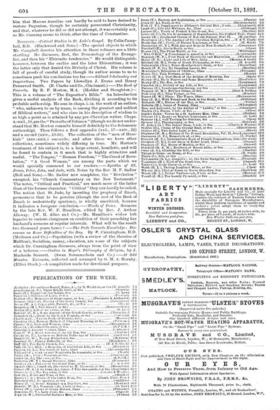DIvrNITT.—Critical Studies in St. Luke's Gospel. By Colin Camp- bell,
B.D. (Blackwood and Sons.)—The special objects to which Mr. Campbell devotes his attention in these volumes are a little startling. He discusses, first, the Demonology of the Evange- list, and then his " Ebironite tendencies." He would distinguish, however, between the earlier and the later Ebironitism ; it was the latter only that denied the Divinity of Christ. His volume is full of proofs of careful study, though its author seems to us to sometimes push his conclusions too far.—Biblical Scholarship and Inspirations. Two Papers by Llewellyn J. Evans and Henry Preserved Smith. (R. Clarke and Co., Cincinnati.) —The Book of Proverbs. By R. F. Horton, M.A. (Hodder and Stoughton.)— This is a volume of " The Expositor's Bible." An Introduction gives a useful analysis of the Book, dividing it according to its probable authorship. He sees in chaps. i.-ix. the work of an author, " who, unknown to us by name, is among the greatest and noblest of Biblical writers," and who rises in his description of wisdom to as high a point as is attained by any pre- Christian writer. Chaps. x.-xxii.,16, are the "Proverbs of Solomon" (though we do not under- stand that Mr. Horton commits himself definitely to the Solomonic authorship). Then follows a first appendix (xxii., 17—xxiv., 22) and a second (xxiv., 23-35). The collection of the " men of Heze- kiah" (xxv.-xxix.) succeeds ; and after these we have other collections, sometimes widely differing in tone. Mr. Horton's treatment of his subject is, to a large extent, homiletic, and will be found to contain in it much that is highly attractive and useful. " The Tongue," " Human Freedom," " The Creed of Reve- lation," " A Good Woman," are among the parts which we would specially commend to our readers.—Epistles of SS. James, Peter, John, and Jude, with Notes by the Rev. M. F. Sadler (Bell and Sons).—Mr. Sadler now completes, the " Revelation " excepted, his "Church Commentary on the New Testament." The notes, " Critical and Practical," are much more of the latter than of the former character. " Critical " they can hardly be called. The notion that St. Jude, by inserting the prophecy of Enoch, pronounces that to be genuine (though the rest of the Book of Enoch is undoubtedly spurious), is wholly uncritical, because it indicates a foregone conclusion.—Words of Peace. Sermons by the late Rev. W. F. Hamilton, edited by Rev. J. Arthur Alloway. (W. H. Allen and Co.)—Mr. Hamilton's widow left legacies to various clergymen on condition of their preaching her husband's sermons at regular intervals. What will be the result two thousand years hence ?—The Path Towards Knowledge : Dis- courses on Some Difficulties of the Day. By W. Cunningham, D.D. (Methuen and Co.)—Population (with a review of the theories of Malthus), Socialism, money, education, are some of the subjects which Dr. Cunningham discusses, always from the point of view of a believer.—Studies in Heget's Philosophy of Religion, by J. Macbride Sterrett. (Swan Sonnenschein and Co.)—At Odd Minutes. Extracts, collected and arranged by G. M. A. Hornby. (Elliot Stock.)—A compilation made for devotional purposes.


































 Previous page
Previous page